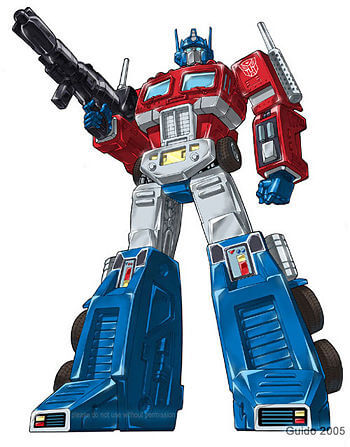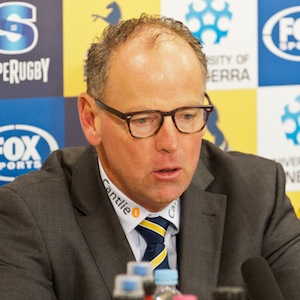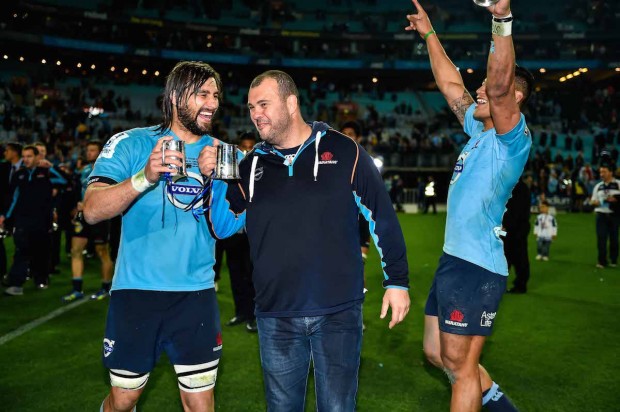In the climax to the 1986 animated classic, Transformers, Optimus Prime places the Matrix into his chest, sacrificing himself for the good of humanity, and utters the immortal line, “Now, we light our darkest hour.” Newly energised, the Autobots proceed to get the upper hand in their battle against the villain, the transforming planet Unicron, voiced by Orson Welles in his last ever film role. Unicron ultimately explodes, writhing in pain – which is a pretty fair representation of the plight of Australian rugby fans at the moment.
 1986 was, of course, when the men in gold last won at Eden Park, and won the Bledisloe 2-1 with the entire series played in New Zealand. The coach, Alan Jones, was out within eighteen months.
1986 was, of course, when the men in gold last won at Eden Park, and won the Bledisloe 2-1 with the entire series played in New Zealand. The coach, Alan Jones, was out within eighteen months.
But rather than subjecting ourselves to more self-harm by either re-watching a one-point loss to the All Blacks, or acknowledging Australian rugby’s connection to Alan Jones, or watching the modern Transformer remakes (particularly the Megan Fox-less sequels), let’s look forward.
Who should be the new coach? And what challenges lie ahead?
New Directions
For all the talk of Tony McGahan and Stephen Larkham, if we’re talking about long-term options, we’re looking at a two horse race. Michael Cheika or Jake White.
Wallaby rugby under Jake White is easy to envisage. Jakeball developed during the World Cup Springboks of 2007, before really coming into its own with the Brumbies and the Sharks. Jakeball is ideological, template rugby. Start with a forward pack with impeccable set piece credentials. Lock in likewise a kicking 9, 10, and 15. Then play territory. Jakeball teams simply don’t play rugby in their own third, and often their own half. They create pressure, force mistakes, then capitalise on them. It can be very effective.
That this approach is the antithesis of Australian rugby culture, likely to alienate fans, and hardly attract sponsors are all important points.
But more important, and to me, decisive, is that the Wallaby set up just doesn’t have the pieces to fit into this picture. Jesse Mogg is the only kicking 15 in Australia and (very) far from the best player in that position. Neither Quade Cooper nor Bernard Foley could conceivably fit into a Jakeball structure at all. And Nic White is the only kicking 9. It just isn’t feasible to imagine a Wallaby team with (say) Will Genia, Cooper, and Israel Folau all hanging back deep… with ironclad instructions to return kicks with their own  up and unders.
up and unders.
Sure, Jakeball “worked” at the Brumbies, but in truth the team was heavily reliant on Matt Toomua, White, and Jesse Mogg staying fit, a world class lineout run by Ben Mowen, and some truly awesome goal kicking from Christian Lealiifano. Plus when David Pocock got injured, they were able to bring in none other than George Smith.
Rugby is a game of inches. Any of those things not being present and the Brumbies wouldn’t have made the finals.
Jakeball would be unlikely to succeed on the field and the fans off the field don’t want him as a coach. That really should be where the ARU stops pursuing this avenue.
Cheika
Michael Cheika is the only head coach to have won both the Heineken Cup and the Super Rugby trophies. Quite the CV. His Waratahs won the 2014 comp and did so while playing a highly attractive brand of football (which, as I’ve written here before, should be seen as an added bonus, not the key determinant). But his Leinster team played very differently; it’s clear, watching a few old game tapes, that Cheika developed a style of play that would work with the players at his disposal in Sydney.
Emboldened by his success using running rugby this year, Cheika would be highly likely to replicate the same ideas at the national level (especially given the very limited time frame involved). It’s almost impossible to look at the type of players available at the national level and think that White’s ideas on the field are better suited to the raw materials at hand than Cheika’s.
If performance is one half of the equation facing the ARU in their shot-gun hiring process this week, culture is the other. Can Jake White introduce a new, foreign team culture in the nine test matches before the World Cup? It seems unlikely. But will Cheika have an easier time transplanting his team culture from the Waratahs to the Wallabies, heavy on top-down direction and team-centric buy-in?
Culture
I’m currently in South Africa, where John Mitchell’s autobiography is flying off the shelves. His chapter on his issues at the Western Force is highly illuminating of the culture issues in Australian rugby. Even with his vast and varied coaching experience, Mitchell minces no words when it comes to his criticism of Australian players’ notion of their own agency in coaching and team management issues.
‘One thing I picked up is that Australian players like to take ownership quickly. They don’t have much respect for authority and constantly challenge you to relinquish your leadership, even when it involves [game play] ideas and strategies. This is very different from the ethos I have found in New Zealand and South African rugby.’
Player power, he goes on, was a constant obstacle, with player unions ‘much more prominent’ than elsewhere.
Recent events stink of a player-driven palace coup, as illuminated on the G&GR podcast. Cheika clearly commands strong loyalty at the Tahs. His success in doing so using seems somewhat at odds with the recollections of Mitchell (a not dissimilar type of coach).
The problem for Cheika will be shifting his identity as a coach and relationship with the players to a truly national level. This was something McKenzie understood well. Choosing Matt Toomua at 10 in his first two matches and making Ben Mowen his captain sent a strong, irrefutable signal that he was now the coach of Australia, not Queensland.
If Cheika gets the job, tough choices along these lines will immediately present themselves. Rob Simmons looked at times in the first half on Saturday that he really wished he was somewhere else than on the field. He has been McKenzie’s lineout general and a key forward leader for almost five years now and probably had an inkling of what was going down. The players who came out in defence of McKenzie and his team – Lealiifano, Stephen Moore – were both not Waratahs.
Cheika has to avoid even the mere perception of partisanship. The return from injury of Will Genia and Quade Cooper might help him in this regard, enabling him to bench or rotate Tahs Nick Phipps and Bernard Foley.
But the key will be at captain. Cheika needs someone that he can communicate through but who is part of the team management structure, not essentially a player representative. The Wallaby captain should exemplify every value, conduct, and behaviour that the team represents, both on and off the field. Think Richie McCaw. Or John Eales.
Being verbally reprimanded by the referee on Saturday should be the end of Michael Hooper as captain. More importantly, Cheika would be making a huge mistake with the non-New South Wales players if he didn’t move to broaden his support base and show that all players were equal in his book. For that alone, Hooper should go, for the team’s sake.
The cupboard is pretty bare. It is telling that David Pocock receives extensive praise in Mitchell’s book; he also was asked to write the Foreword for Robbie Deans’. Stephen Moore’s injury was very unfortunate. James Horwill is probably the only player with proven leadership credentials who could, on form, be a first-pick lock; as such, he really should be the frontrunner. James Slipper, consistently the best Wallaby this year and an automatic pick, would be another choice.
If he were the best 7, Matt Hodgson would be an almost automatic pick as captain; players and coaches alike agree he is a superb team leader and a total team man. (Mitchell’s book includes a good story about Hodgson telling JOC to stop asking for more money and commit to the Force organisation, with four letter words excised.)
One way or another, it’s been a horror two weeks for anyone vaguely connected with Australian rugby. With every day, more crap involving players, staff members, and journalists all acting like soap opera leads. We now need our Optimus Prime to light our darkest hour.



